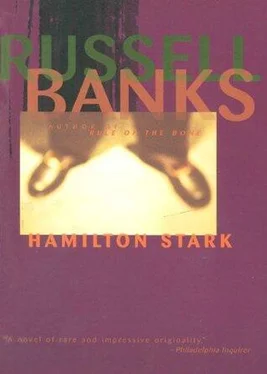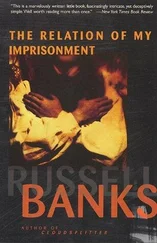“Jesus Christ!” Feeney yelled. “You did it! You really took the guy!” He was clapping Alvin on the shoulder and staring down at the man on the ground.
Alvin pulled his jacket and tie out of Feeney’s other hand and shoved his arms into the jacket and slung the necktie around his neck without knotting it. He turned and started straight down the alley toward the street.
“Hey! Where ya goin’? What about the broad? Where ya goin’?”
“Home,” Alvin grunted and kept on moving, head down, for the street.
“Okay, I’ll get your raincoat. You left it inside,” Feeney called to him.
“Yeah.” Then he was gone from sight.
Feeney turned around, a puzzled but still exhilarated expression on his face. “Jesus.” The sailors had gone back inside. The man on the ground was slowly, awkwardly getting to his feet. “You okay?” Feeney asked him quietly.
The man was bleeding from the mouth and nose. He stood, bent over, clutching his left side, breathing laboriously. His clothes were smeared with mud and fresh blood. “I gotta … busted … rib. I think… Tell Freddie… C’mere. Th’ bartender…”
“Sure.” Feeney walked somberly inside, told the bartender he’d better check the guy out and maybe get him a doctor or something, the guy seemed pretty busted up. Plucking Alvin’s tan raincoat from the coatrack, he pointedly avoided even a glance at the woman in the booth next to it and started walking out the door at the front.
“Where’s the other one?” the bartender asked. He had come out from behind the bar and was on his way toward the back door. “I don’t wanta see him in here again. You tell him that.”
“No sweat,” Feeney said, grinning. “No sweat at all.” Then he looked down at the woman. Serious-faced, she was sipping from her gin and tonic. She caught him staring, and without removing her pink lips from the rim of the glass, gave him the finger.
Feeney laughed and strolled happily out. When he reached the car and got in, he looked over at Alvin behind the steering wheel. He was smiling and the car motor was running.
“Feelin’ pretty tough, ain’t ya?” Feeney observed.
“Yeah. Like a bucket full of nails.” Then he jammed the car into gear, and they headed back to New Hampshire.
I was grateful for the story, grateful to Rochelle for having delivered it to me, for having written it in the first place. But the story complicated things for me far more than it simplified them. I asked Rochelle if it complicated things for her, too, and she said no, not really, which surprised me.
“But he sounds so ordinary ,” I pointed out to her, “like almost any young man already determined at adolescence by social and familial past, one of those angry American youths locked into patterns of violence, drunkenness and sexual exploitation. Even if he eventually raised his consciousness to the point where he could direct his anger politically, rather than mutely against himself,” I observed to her, “he’d still be little more than another feeble example of the type called ‘working-class hero.’” And both Rochelle and I were claiming much more for him than that.
It was not exactly what I had been looking for in a story about Hamilton’s brush with a college education. I had wanted him to be offered a full scholarship, say, by Harvard or Princeton or Yale, and after visiting one of those campuses and encountering there for the first time an example or two of the academic mind, to reject the offered scholarship with some sort of truth-telling gesture of defiance. It would have made a marvelously effective vehicle for social satire.
“My father is not Holden Caulfield all grown up,” Rochelle said, sounding a little hurt.
I couldn’t tell if it was her author’s pride that had been bruised or the pride of a daughter who believes that she understands her parent better than any stranger can. In either case, though, she was justified in feeling hurt, so I apologized, first for my persistently soft-headed expectations that Hamilton’s past could be anticipated any more than could his future, and second, for not having immediately expressed my enthusiasm for the skill and restraint with which she had told her story.
“As always,” I explained to her, “your literary gifts amaze and delight me. Especially when placed next to my own awkward attempts.”
She smiled politely.
“Look,” I brightly said, “the sun has risen above the trees! Shall we go downstairs for breakfast? Or would you like to let me make love to you?”
“Oh, you devil. Don’t you ever get tired?”
“Eventually,” I confessed.
“You some kind of billy goat, honey,” she purred in that southern accent of hers, the one that stiffens me with lust.
Chapter 8. 100 Selected, Uninteresting Things Done and Said by Hamilton Stark
1. HE DROVE PAST A HITCHHIKER without picking him up. The hitchhiker was a long-haired youth in an army field jacket whose stance and bulky physical proportions reminded him for a second, as he later said, of the author’s younger brother, now dead, whom Hamilton had met only once, several years before.
2. He bought a new saxophone (tenor) but still preferred the old one.
3. After placing a classified ad in the Concord Daily Monitor , he sold his new saxaphone for $25 less than he had paid for it. He considered the loss not bad at all. “Self-knowledge always has a price.”
4. Between his second and third wives, he perfected a technique for getting out of bed in the morning in such a way that he had to make the bed only once every ten days or so. The technique involved spreading his legs under the covers to the far corners of the bed and then dragging his long body toward the top of the bed, where, springing his weight with his arms against the brass rail headboard, he lifted himself to the floor. When he married for the third time he ceased this activity, but when the woman left he resumed it until he married again. He also employed the technique between his fourth and fifth wives and after his fifth wife had left.
5. He changed his brand of cigarettes twice in his life — from Chesterfields to Camels to Lucky Strikes, which he now smokes at the rate of one pack a day.
6. He never learned to fly an airplane, though he often expressed a desire to do so.
7. When he was twenty-six years old he learned to drive a bulldozer, an activity he still enjoys. So much so that when he was thirty he purchased his own bulldozer, a small Caterpillar that he painted black and keeps waxed and shiny, even the blade, which he retouches with black enamel after each use.
8. In winter he usually wears a navy blue woolen watchcap. He rarely covers his ears with it. They are small and turn red from the cold, but he doesn’t seem to notice or care.
9. He cut down a dying maple tree behind his barn and that winter used the wood for his fireplace. He remembered having looked at the tree from his earliest childhood, and he thought of this while he was cutting it into fireplace-length pieces. He used his chain saw for the cutting, used it expertly, especially for a man who was not a bona fide woodcutter.
10. He never in his entire life wore a pair of sandals. Never even tried them on in a shoestore.
11. He never defaulted on a debt, and his checking account was never overdrawn. Once, however, he was tempted to default on a television set he had bought on time from Sears, Roebuck & Co. He made his payments punctually for fourteen months, and when the set broke down for the fifth time, he threw it away in anger, tossed it over the fence into the field in front of the house. With ten months remaining, and no television set to be repossessed or repaired, he threatened in a letter not to make any more payments, but instead sent his checks in nine days late each month until the balance was paid. After that he was reluctant to purchase any more appliances on time; he said it made it more difficult for him to get rid of them when he wanted to.
Читать дальше












